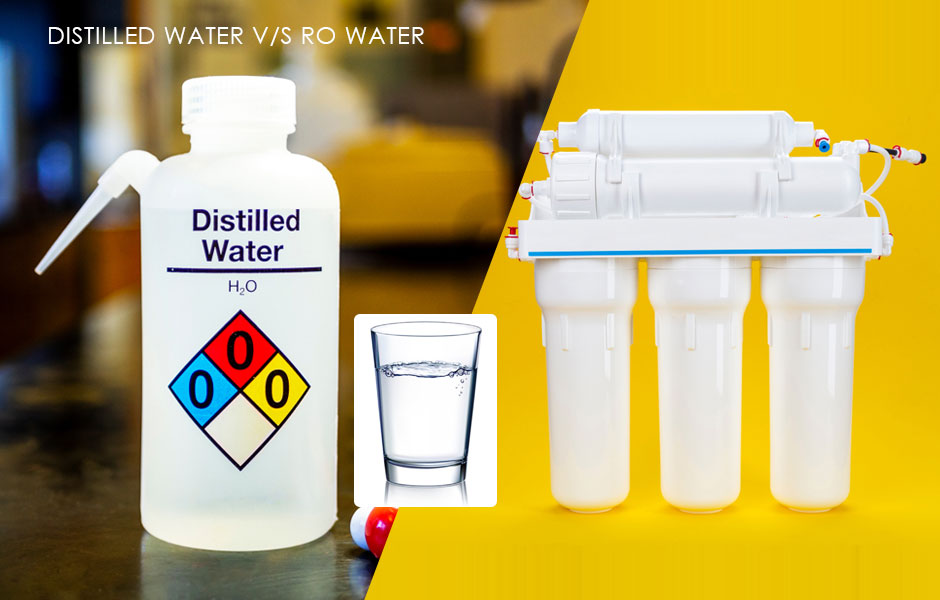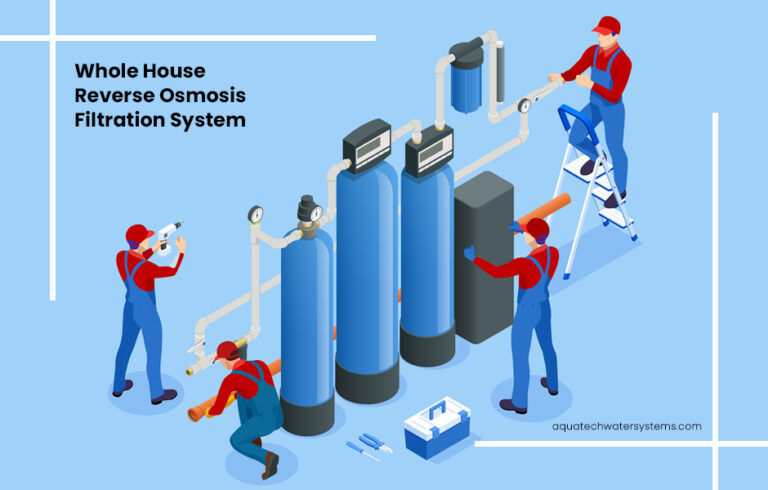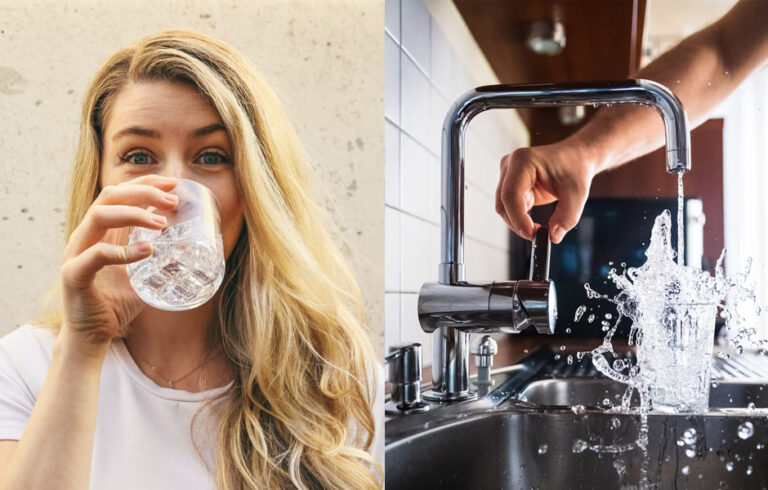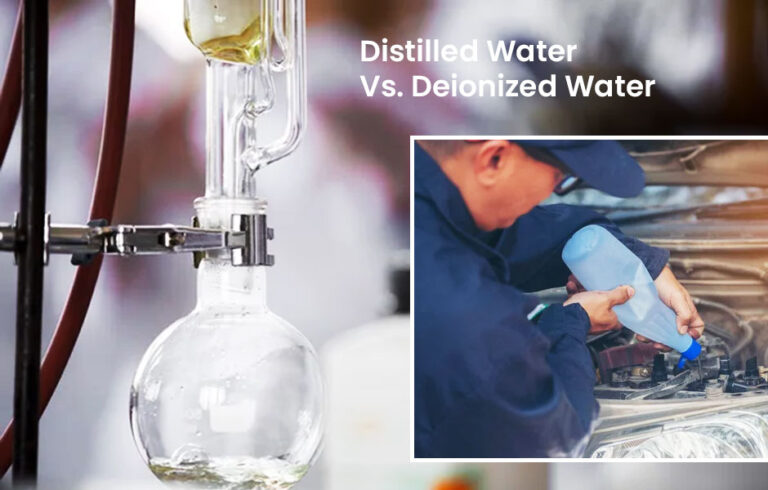The question of distilled water VS. RO water has been debated for decades, and it is not easy to answer! It all depends on your personal preference, the area you live in, and the contaminants in your tap water.
So let us break it down: Distilled water is purer than regular tap water because it does not contain any minerals or chemicals (the only thing left after distillation is pure H2O).
However, most people say that RO (reverse osmosis) filtered water tastes better since the process removes chlorine taste and smell from the regular tap. If you are looking for a more natural option, then distilled water might be your best choice. However, if you want to use tap water instead of distilled bottled water, connecting RO to your existing tap water is viable.
In this article, let us look into the differences between distilled and RO waters – What is healthier? What tastes better? Moreover, why should you care about either?
We will also discuss the benefits and drawbacks of both distilled water and RO water. We will start by giving a brief overview of each type of water as well as its differences. Then we will provide our opinion on which is healthier for you to drink!
Let us find out!
What is distilled water?
Distillation is a process in which contaminated water is heated until it evaporates. It is then condensed back into a liquid state and distilled to separate contaminants from the water itself, leaving you with clean filtered water.
In simpler terms, distillation turns liquid water into steam and allows it to reform into liquid water.
For distilled water to be “pure,” all inorganic materials must be removed during distillation, such as salt, sulfur, iron oxide/rust, manganese, and other particles.
Distilled water is also known as distilled H20 because it is hydrogen and oxygen atoms that have been separated from each other, giving the liquid a single proton, electron, and atom of oxygen making into pure distilled water – this separates all chemicals or minerals within it.
The process itself can vary depending on who distilled it and how. However, for the most part, distilled water is free from almost all contaminants, except for volatile organic contaminants. The center for disease control(CDC) also mentions that distillation of water does not remove all volatile organic contaminants.
This type of water sounds like a great option to drink and enjoy because there is no risk of ingesting any chemicals or minerals that may be in your tap water. However, while distilled water might not contain anything harmful, it lacks the minerals and electrolytes that your body needs to maintain healthy cells.
What is RO (reverse osmosis) water?
RO or reverse osmosis filtered water is a method of purifying water that uses a membrane to filter out smaller impurities. It has various stages of filtration to remove contaminants from the water, including a pre-filter to catch large particles and dirt/dust before moving on to UV, Carbon, and Reverse Osmosis.
The end product is pure water that you can drink or use for cooking, but with a few more added minerals to give it some taste!
Which water tastes better? RO or distilled water?
There is a significant debate on this topic. While distilled water tastes ‘flat’ because it has no minerals, RO water can taste ‘softer’ because it adds required minerals back in.
So, RO filtered water tastes better than distilled water because the process removes chlorine from the tap, giving your drinking water a clean flavor without too much of an aftertaste.
RO water is a form of distilled water that has gone through an additional process. Also, RO filtered water is the best way to get pure distilled water without spending too much money buying distilled bottled water.
If you are looking for a more natural option than a regular tap, but do not want to spend much money on distilled bottled options, then RO is a great choice.
One of the best things about distilled water is that it tastes a lot better than tap, especially if you have hard water from your local city’s source.
Health benefits of drinking RO vs. distilled water?
Both distilled water and RO filtered water are healthier than drinking tap or bottled water because of the lack of impurities found in each type.
Unlike distilled water, RO filtered water can be beneficial to your health because it contains added minerals that are good for your health.
While distilled water is free from any harmful chemicals or contaminants, distilled water also lacks essential nutrients like magnesium and calcium – the latter being especially vital for pregnant women.
RO filtered water has a high concentration of calcium and magnesium, which can be especially helpful for pregnant women because it helps to reduce the risk of pre-eclampsia. Reverse osmosis is beneficial for those with thyroid problems as it can help regulate your body’s chemical balance.
However, distilled water is not all bad! Studies have shown that distilled water is beneficial in people suffering from kidney issues or detoxing their bodies because distilled water pulls out toxins from your system. For example, distilled water can help lower the risk of kidney stones by flushing out excess calcium and other minerals that could contribute to their formation.
By boiling the water until it evaporates, distillation effectively kills any bacteria, viruses, and other microorganisms that might be present in your water. So distilled water is often used for sterilization and cleaning.
RO water filters eliminate excessive chlorine from your drinking water if high chloramine levels are present in your tap water. It also eliminates dirt and bacteria, so you do not have to worry about them being in your drinking water, leading to health problems later on.
Advantages of Distilled Water
- Distilled water contains fewer minerals than tap water, making it more suitable for consumption among those with certain health conditions or on medication that can interfere with mineral absorption.
- Distilled water is often used for cleaning and sterilization purposes, so it is perfect if you want to clean your house.
- It is very beneficial for skin and hair, especially if you live in an area where the tap water contains a high level of chlorine or other impurities like fluoride.
Advantages of RO Water
- The reverse osmosis process effectively eliminates harmful chemicals, bacteria, pathogens, and other contaminants from your tap water, making it a safe and healthy option.
- It contains added minerals that are beneficial to your health. Reverse osmosis also helps to prevent diseases caused by high fluoride levels in drinking water.
- Quick and easy installation, as it draws water from your existing water source.
- Available as multiple options from under sink RO filters to bottleless hot and cold RO water dispensers.
- RO water filters are cost-effective as they also come in both once-off purchasing and a low monthly rental option.
Disadvantages of Distilled Water
- It lacks beneficial minerals, so it is not suitable for those with certain health conditions which may be exacerbated by distilled water.
- Distilled water has a low pH level, which can adversely affect the human body over time, especially when consumed daily.
- Distillation takes more time than standard filtration systems, hence difficult to provide ready to use purified water on demand.
- Will not eliminate contaminants with a lower boiling point because distilled water boils at 100 degrees Celsius.
- Bottled distilled water can cause harm to the environment through the production of plastic bottles and their disposal.
Disadvantages of RO Water
- Reverse osmosis water filters are expensive to install, maintain and replace. However, most of the monthly rental option comes with free filter replacement and annual maintenance.
- RO water filter wastes much water. For every gallon of water produced, approximately two to three gallons of water is wasted.
How can you avail both these options?
Distilled water is available through distilled water dispensers (also known as distillers) that boil and cool filtered water. You need electricity to use distilled water dispensers as it involves heating/boiling.
These distillers can take up to a few hours to produce distilled water, making them less convenient in an emergency.
RO water filters can be availed through reverse osmosis filtration systems by either purchasing or renting them.
Reverse osmosis water filters may be installed under the sink, on a countertop, or as a dispenser with both hot and cold water options. You can also hook it up to your refrigerator.
Conclusion:
Distilled water and RO water both have their advantages and disadvantages. Distilled water is suitable for specific medical conditions. In some cases, distilled water can be consumed with added minerals to suit your needs.
However, with an RO water filtration system, you get purified drinking water without all of the contaminants and added minerals at a relatively lower cost.
In our opinion, RO water is healthier than distilled water or filtered tap water because of its risk-free performance, low maintenance requirements, and environmental friendliness.
Disclaimer: The information mentioned in this article is our personal opinion. If you have any medical questions or concerns, we recommend consulting a physician before making changes to your diet/day-to-day life.
This article was originally published in Dec-2020 and was last updated in Jan-2023
Author: Sarah Williams
Category: Drinking Water




